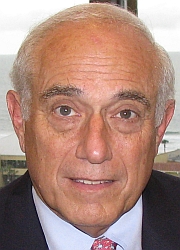Charles Lichtigman, CEO of Charles Wayne Properties, Inc. Featured in Daytona Beach News-Journal
Commercial Real Estate Developer Offers View of Upswing in Volusia Land Sales
By BOB KOSLOW, BUSINESS WRITER

- Charles Lichtigman, CEO & Chairman
Charles Lichtigman is founder, chairman and chief executive officer of Charles Wayne Properties.
Following a handful of Volusia County oceanfront hotel and vacant land sales this year, The Daytona Beach News-Journal asked Charles Lichtigman to provide some insight into what’s causing the sudden spending.
Lichtigman is founder, chairman and chief executive officer of Charles Wayne Properties, one of Central Florida’s largest commercial real estate firms. The company was founded in Daytona Beach in 1978 and was the area’s largest home builder until the division was sold in 1989 and the firm focused on commercial real estate with offices in Daytona Beach, DeLand, Melbourne, Ocala and Orlando. It develops, owns, leases, manages and brokers commercial properties as well as consults. Its current portfolio is primarily concentrated in central and north Florida, Georgia and South Carolina and valued in excess of $150 million.
After graduating Yale Law School in 1966, Lichtigman worked in mergers, acquisitions and long-range planning for Continental Can Company. He was Assistant to the President of Sun Chemical Corp. from 1969 to 1972 and in charge of planning, financial and acquisition functions.
He was also in the U.S. Army Reserves from 1966 to 1972.
From 1972 until 1978, he was vice president of ITT Community Development Corp. and responsible for commercial, industrial and residential activities. During his tenure, more than 2,000 homes or condos were built along with Palm Harbor Shopping Center and Palm Coast West Commerce/Industrial Park.
What’s caused the recent rash of oceanfront hotel and vacant beachfront land sales this year?
Lenders and other property owners were finally able to satisfy themselves as to what prices needed to be to sell their properties. We represent consortiums of over 50 lenders, from throughout the country. For two years, there were virtually no transactions. Property owners (lenders in particular) would attempt to market at higher prices, asking the question, “How do I know that the market isn’t there at 100 percent of my original loan principal if I don’t try to sell it at that?”
Many of these loans were made at or near the peak. To try to sell properties when there is no market is a time consuming process until the price gets low enough to bring buyers out of the woodwork. Well, they finally came out at 10 to 20 percent of what values were four years ago. Once lenders realized they had to write down the properties to the new market — and had built up cash reserves sufficient to take their losses — then properties began to move.
Have you seen bidding wars, multiple interest on any property or a certain type of property?
Yes. We had over 30 letters of intent on the Super 8 Hotel, which was just sold to a Canadian investor group by Independent Bankers Bank. But, to attract this type of interest, buyers have got to see asking prices in realistic ranges. If a property is significantly overpriced, investors will move to lower hanging fruit. They don’t want to waste time doing due diligence on a property which isn’t likely to be sold. The properties in this region that seem to go the fastest are income producing hotels being sold to investors and operators and raw land on the ocean being sold to investors, not developers or operators.
Can you categorize the type buyers, ie, investors or developers?
Most of the buyers on the beach today are investors seeking returns in the 15-25 percent per year range and planning to resell the properties in three to 10 years. But, there are also some buyers, many from foreign countries, who are looking at hotel development in the next two years. Despite the fact that they may develop, these buyers are still seeking to capitalize on today’s discounted price levels. The other pool of buyers is composed of hotel operators who are buying for income and doing major or minor renovation.
Are the hotel purchases by people wanting to run the hotels or eventually tear them down for condos?
Many buyers are buying for hotel use, with an exit strategy in 5-10 years for condominiums or timeshare. But, by far, the hotel use drives the purchase.
Are the beachfront land sales for investments or do the buyers have building plans?
We have seen no buyers with plans to build immediately. It’s virtually all for investment. The only exception may be for land within or near the e-zone, where buyers are looking at a nearer term potential for a business or convention hotel.
What’s it going to take, other than a global economic recovery, to see some new development or major renovations on these oceanfront properties?
The dedication of the city and business community to evaluating financing mechanisms which would make hotels feasible is a positive. With room rates today, hotel development is not profitable without subsidies of some sort and low cost financing, which may rely on future tax revenues, could provide that. Otherwise we need to see significant regional and global economic improvement so that people can afford to travel and spend at levels they did in the past.
What does all these recent sales mean for the community’s present and future prosperity?
Turnover of properties to investors from throughout the world means a whole new group of people who are “invested” in the Daytona Beach metro area. On the positive side, price levels have come down so much, that when demand re-emerges, the risk of new development is hedged for the investor
Originally appeared on News-Journal Online at:
http://www.news-journalonline.com/business/real-estate/2011/10/23/commercial-real-estate-developer-offers-view-of-upswing-in-volusia-land-sales.html
